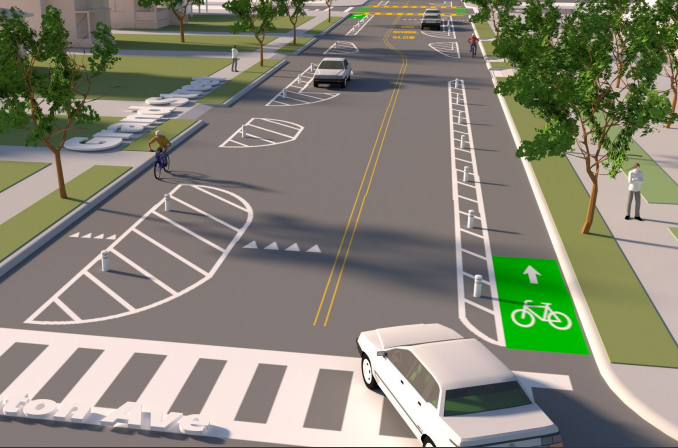Note: GJEL Accident Attorneys regularly sponsors coverage on Streetsblog San Francisco and Streetsblog California. Unless noted in the story, GJEL Accident Attorneys is not consulted for the content or editorial direction of the sponsored content.
Which is a higher priority: protected bike lanes and improved safety on a major north-south street in the island city of Alameda, or convenient on-street storage for private cars? That will be the topic of discussion at Wednesday evening's Transportation Commission hearing.
From the commission's agenda:
The project area is approximately 0.7 miles long and is a major north-south multimodal corridor. It is also a high-injury corridor with high crash intersections at Otis Drive and at Shore Line Drive, according to the City's Vision Zero Action Plan. Wood Middle School, Rittler Park and the Alameda shoreline are adjacent to Grand Street, and Franklin Elementary School, Franklin Park, and St. Joseph’s Elementary School are within ¼ mile of Grand Street. Grand Street connects with existing bicycle facilities on Shore Line Drive and Otis Drive and will connect with future bike lanes on Encinal Avenue that Caltrans will install in the next year. AC Transit currently serves Grand Street between Shore Line Drive and Otis Drive.
"I bike across Alameda often, either alone or with my two kids," advocate and Alameda resident Drew Dara-Abrams told Streetsblog. "There are some fabulous east-west routes, but jogging north and south between them is a challenge. A bike network is only as good as its weakest link, and this is the weakest link for trying to move north-south."

"The new proposal much better aligns with city plans and policies that explicitly prioritize safe biking facilities over parking in our public rights of way," wrote the advocates at Bike Walk Alameda in a post about the project.
The post references the following city policies:
- Safety First: When designing streets, the safest treatments should be considered the default starting point and be degraded only if necessary after documenting rationale for the approach. (Policy ME-6, Action B)
- Space Priorities: When allocating public right-of-way space, the first consideration shall be for people walking, bicycling, and using transit. Space for on-street parking shall be the lower priority. (Policy ME-6, Action G)
- Low-Stress Bikeways: Provide separated bicycle lanes instead of unprotected, standard bicycle lanes, unless not feasible. (Policy ME-14, Action H)
However, it seems the usual forces have assembled to try and stop the protected bike lane component of the project, in order to assure zero loss of on-street parking, as Dara-Abrams Tweets about below:
"This is the most expensive area of Alameda and they do NOT like change," wrote Bike Walk Alameda's Denyse Trepanier in an email to Streetsblog.
According to the results of a survey done by the city, 73 percent of respondents want improved bike safety, even if it eliminates on-street parking. Only 27 percent prioritized keeping all on-street parking. Nevertheless, word has it that the Mayor of Alameda, Marilyn Ezzy Ashcraft, is sympathetic to the idea of cutting the protected bike lanes. When asked about it via email on Tuesday, she replied, "This item hasn’t come to the City Council yet – the Transportation Commission will consider it tomorrow evening – so I haven’t weighed in yet."
Other politicians in Alameda, however, didn't shy away from sharing their views. "Protected bike lanes on Grand is a no-brainer," wrote Alameda City Councilperson John Knox White in an email to Streetsblog. "We are not serious about safety and climate if they aren’t installed."
"These are an important safety upgrade from the mostly paint-only bike lanes originally proposed, and key to the safety of bicyclists — and potential bicyclists — who ride along this Tier-1 High Injury Corridor," wrote Trepanier in a post on social media. "That this safety enhancement can be in place, offering thousands of Alamedans safer mobility as soon as this time next year, is a very exciting prospect, and the kind of action our Vision Zero 2035 commitment calls for."
Bike Walk Alameda has put together the following list of steps readers can take to support protected bike lanes on Grand:
- Make a comment of support at the Transportation Commission virtual meeting: Wednesday/tonight, May 25 at 6:30 p.m. The meeting link is here. It’s Item 6A, described in detail here. You can also write a note to all of the Commissioners by sending an email to Gail Payne at gpayne@alamedaca.gov
- Write to City Council members (addresses here) and attend the City Council meeting: Tuesday, July 5 at 7 p.m.
***
Update 5/26, Transportation Commission unanimously approves protected bike lanes on Grand... now on to the City Council in July!





